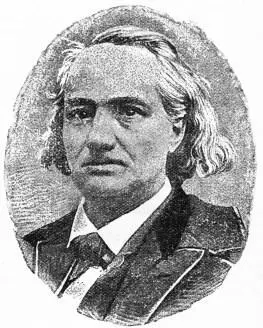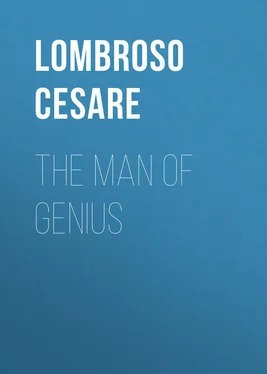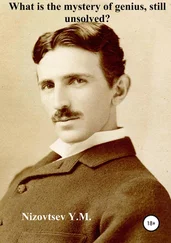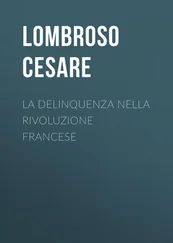Cesare Lombroso - The Man of Genius
Здесь есть возможность читать онлайн «Cesare Lombroso - The Man of Genius» — ознакомительный отрывок электронной книги совершенно бесплатно, а после прочтения отрывка купить полную версию. В некоторых случаях можно слушать аудио, скачать через торрент в формате fb2 и присутствует краткое содержание. Жанр: foreign_antique, foreign_prose, на английском языке. Описание произведения, (предисловие) а так же отзывы посетителей доступны на портале библиотеки ЛибКат.
- Название:The Man of Genius
- Автор:
- Жанр:
- Год:неизвестен
- ISBN:нет данных
- Рейтинг книги:5 / 5. Голосов: 1
-
Избранное:Добавить в избранное
- Отзывы:
-
Ваша оценка:
- 100
- 1
- 2
- 3
- 4
- 5
The Man of Genius: краткое содержание, описание и аннотация
Предлагаем к чтению аннотацию, описание, краткое содержание или предисловие (зависит от того, что написал сам автор книги «The Man of Genius»). Если вы не нашли необходимую информацию о книге — напишите в комментариях, мы постараемся отыскать её.
The Man of Genius — читать онлайн ознакомительный отрывок
Ниже представлен текст книги, разбитый по страницам. Система сохранения места последней прочитанной страницы, позволяет с удобством читать онлайн бесплатно книгу «The Man of Genius», без необходимости каждый раз заново искать на чём Вы остановились. Поставьте закладку, и сможете в любой момент перейти на страницу, на которой закончили чтение.
Интервал:
Закладка:
One day, at sunset, he was on the balcony of a house. He suddenly saw a phantom and heard a voice calling him. He ran forward, fell, and was nearly killed. That was his first attack, characterised by hallucinations of sight and hearing.
Towards the end of his life, at the age of forty-six, folie des grandeurs developed in him; he spoke of his châteaux at Ermenonville, of his physical beauty which was astonishing, he said, to his attendants; he bought up coins of Nerva, not wishing that the name of his ancestors should circulate as money, yet Nerval was only a pseudonym. Sometimes he gave out that he was a descendant of Folobello de Nerva whose history he wished to write, and all whose male descendants presented, according to him, a supernatural sign, the tetragramma of Solomon, on their breasts. Timid and cautious in his days of calm, he became bold and noisy when the attack came on, and even threatened his friends with weapons. In spite of the low temperature he refused to leave off his summer clothes. “Cold,” he declared, “is a tonic and the Lapps are never ill.” A few days after, he hanged himself. 157 157 Maxime du Camp, Souvenirs littéraires , 1887.
Baudelaire appears before us, in the portrait placed at

BAUDELAIRE.
the beginning of his posthumous works, as the type of the lunatic possessed by the Délire des grandeurs . 158 158 Brunetière, Revue des Deux Mondes , 1887, No. 706. Revue Bleue , July, 1887.
He was descended from a family of insane and eccentric persons. It was not necessary to be an alienist to detect his insanity. In childhood he was subject to hallucinations; and from that period, as he himself confessed, he experienced opposing sentiments; the horror and the ecstasy of life; he was hyperæsthetic and at the same time apathetic; he felt the necessity of freeing himself from “an oasis of horror in a desert of ennui .” Before falling into dementia he committed impulsive acts; for instance, he threw pots from his house against shop windows for the pleasure of hearing them break. He changed his lodgings every month; asked the hospitality of a friend in order to complete work he was engaged on, and wasted his time in reading which had no relation to it whatever. Having lost his father, he quarrelled with his mother’s second husband, and one day, in the presence of friends, attempted to strangle him. Sent out to India, in order, it is said, to be put to business, he lost everything and only brought back from his voyage a negress to whom he dedicated exotic poems. He desired to be original at all costs; gave himself to excess in wine before high personages, dyed his hair green, wore winter garments in summer, and vice versa . He experienced morbid passions in love. He loved ugly and horrible women, negresses, dwarfs, giantesses; to a very beautiful woman he expressed a desire that he might see her suspended by the hands to the ceiling that he might kiss her feet; and kissing the naked foot appears in one of his poems as the equivalent of the sexual act.
He was constantly dreaming of work, calculating the hours and the lines necessary to pay his debts: two months or more. But that was all, and the work was never begun. 159 159 Maxime du Camp, Souvenirs littéraires .
Proud, misanthropic, and apathetic, he said of himself: “Discontented with others and discontented with myself, I desire to redeem myself, to regard myself with a little pride in the silence and solitude of the night. Souls of those I have loved, souls of those I have sung, strengthen me, sustain me, remove from me the lies and the corrupting vapours of the world; and thou, O Lord my God, grant me grace to produce some fine lines which will prove to myself that I am not the last of men, that I am not inferior to those whom I contemn.” 160 160 “A une Heure du Matin,” in Petits Poèmes en Prose .
And he had need of it, for he called Gustave Planche imbecile, Dumas a farceur , Sue stupid, Féval an idiot, George Sand a Veuillot without delicacy. What he attacked in all these writers was the fame he wished to possess; that is why he made fun of Molière and Voltaire.
With the progress of insanity he used to invert words, saying “shut” when he meant to say “open,” &c. He died of progressive general paralysis of the insane, of which his excessive ambition was already a fore-running symptom.
Concato was the son of a poor tailor, the victim of grave cerebral affections. He himself presented certain characters of degeneration, such as pallor and large cheek bones; during many years he was subject to various forms of insanity. At the age of seventeen he was seized by the terror of sudden death, and provided himself with nitre to prevent future cerebral crises. At twenty he resolved to become a monk, although in childhood he had been so little devout that he had fabricated false notes of confession. Afterwards he quarrelled with an Austrian officer, and then became afraid of all sentinels and soldiers. He would never allow an officer to enter his house with his sword by his side; and even in old age trembled at the sight of one of the city guards. One night he dreamt he had committed a homicide, and for many days he was a prey to strange terrors. He suffered from claustrophobia: woe to whomsoever tried to lock him up in a carriage or a room! There were some days during which he considered himself the lowest of men. He was so irascible that he used to say that, to be in good health, one must be angry at least once a day. Yet he was one of the greatest of European physicians. 161 161 Bufalini, Vita di Concato , 1884.
Mainländer had a grandfather who, after the death of a son, carried religious mysticism to the extent of insanity, and died of inflammation of the brain at the age of thirty-three. A brother, also insane, wished to embrace Buddhism. As a youth, looking at the sea at Sorrento, he felt impelled to throw himself in, merely attracted by the purity of the water. He educated himself and wrote his celebrated book, Die Philosophie der Erlösung , but to realize his theories entirely, he adopted a rule of absolute chastity, and on the day on which his book was published hanged himself, the better to confirm a passage which said: “In order that man may be redeemed it is necessary that he should recognize the value of not-being, and desire intensely not to be.” 162 162 Revue Philosophique , 1886.
The great Auguste Comte, the initiator of the positivist philosophy, was for ten years under the care of Esquirol, the famous alienist; he recovered, but only to repudiate, without any cause, the wife who had saved him; later, he – who had wished to abolish all priest-craft – believed himself the priest and apostle of a materialistic religion. In his works, amidst stupendous elucubrations, genuinely maniacal ideas may be found, as, for example, the prophecy that one day women will be fecundated without the help of the male. 163 163 Littré, A. Comte et la Phil. Posit. , 1863.
It is said that mathematicians are exempt from psychical derangements, but this is not true; it is sufficient to recall not only Newton and Enfantin, of whom I will speak at length, but the two famous distractions of Archimedes, the hallucination of Pascal, and the vagaries of the mathematician Codazzi (not to be confounded with Codazza). Codazzi was sub-microcephalic, oxycephalic, alcoholic, sordidly avaricious; to affective insensibility he added vanity so great that while still young he set apart a sum for his own funeral monument, and refused the least help to his starving parents; he admitted no discussion of his judgment even if it only concerned the cut of a coat; and he had taken it into his head that he could compose melodic music with the help of the calculus.
Читать дальшеИнтервал:
Закладка:
Похожие книги на «The Man of Genius»
Представляем Вашему вниманию похожие книги на «The Man of Genius» списком для выбора. Мы отобрали схожую по названию и смыслу литературу в надежде предоставить читателям больше вариантов отыскать новые, интересные, ещё непрочитанные произведения.
Обсуждение, отзывы о книге «The Man of Genius» и просто собственные мнения читателей. Оставьте ваши комментарии, напишите, что Вы думаете о произведении, его смысле или главных героях. Укажите что конкретно понравилось, а что нет, и почему Вы так считаете.












